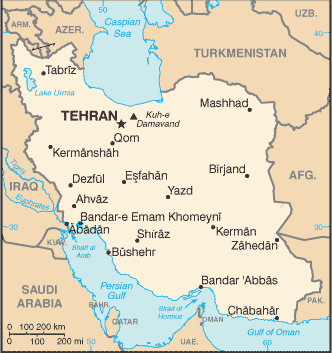The European Union embargo on Iranian oil imports that was pushed for aggressively by the U.S. is aimed at reducing the risk of conflict and stressing the need for peace talks, according to British Foreign Secretary William Hague.
 “This is not a set of actions designed to lead to any conflict but to lead us away from any conflict by increasing the pressure for peaceful settlement of these disputes,” he said on Tuesday.
“This is not a set of actions designed to lead to any conflict but to lead us away from any conflict by increasing the pressure for peaceful settlement of these disputes,” he said on Tuesday.
Despite years of evidence to the contrary, Hague’s comments passed without an outburst of laughter on the world stage. Washington, and most of the EU, has approached Iran in largely the same way since the Iranian revolution in 1979. That is, with threats, sanctions, and isolation. Instead of bringing diplomacy, it has brought only more bitterness and mistrust.
Early in the Bush administration, sanctions were heaped on Iran’s oil sector. As the relationship with Iran, and Tehran’s position on nuclear enrichment, have stayed the same, tensions and war rhetoric escalated. Now, the Obama administration has placed multiple additional sanctions on Iran’s oil and banking sectors, and it has led to even more bellicosity, not less.
Columbia University Professor Gary Sick, who has a special expertise on Iran, viewed the EU oil embargo much differently. He called the efforts “the equivalent of a blockade. It’s an act of war.”





I'm always amazed at the creativity of the Brits when it comes to the English language… Peace? Seriously? These sanctions are designed to cripple the Iranian economy and bring about internal strife, dissension and turmoil. The outcome is most likely going to be war, not peace.
exactly, I killed him for his own good
Thankfully the British empire, whats left of it, will go down with fascist amerika, and its fascist brother israel ! They have killed enough, their fate is sealed !
I say Fuck all the Brits!!!!!!!!!!!!!!!
No wonder Anti-war doesn’t publish my comments, even the civilizes ones.
[moderator’s note: Haven’t seen the civilizes ones (sic) yet. The others, we publish – TLK]
Long live Anti-war moderator! Love you. Will try to make my comments more civilized.
Lies are Truth. War is Peace.
Europeans craving President Obama's Big, Black, Progressive Chopper?
Say it ain't so!
In that case maybe the marines pissing on the Taliban was a 'peace action'. Who are we to judge?
well if we don't strangle their economy and starve the people when we decided to attack them they might fight back and that would not be very peaceful would it?
The British are so morally bankrupt. Meanwhile, the "old empire" sinks further into the pit.
Well, Iran should cut the oil supply to europe, as a lovely gift for them…. which means also peace!!…. you think so?